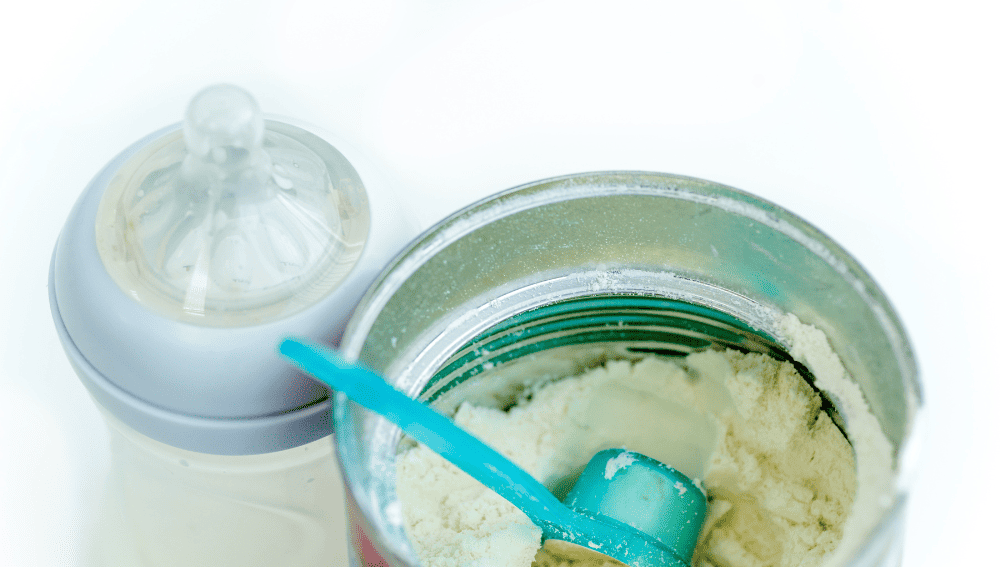When it comes to feeding a baby, parents want to ensure that their little one is getting the best possible nutrition. While formula is a popular option for many parents, it’s important to know what happens if the baby drinks old formula.
This article will explore the potential risks and dangers associated with consuming old formula and provide tips for proper storage and preparation.
Understanding old formula is the first step in preventing potential health risks. Formula that has been opened and left at room temperature for more than an hour is considered old and should be discarded.
Additionally, formula that has been sitting in the refrigerator for more than 24 hours should be thrown away. It’s important to note that formula that has gone bad may not necessarily smell or taste bad, so it’s crucial to follow these guidelines to ensure the safety of your baby.
Signs and symptoms of consuming old formula can vary, but some common signs include vomiting, diarrhea, and fussiness. In severe cases, consuming old formula can lead to dehydration and even hospitalization.
It’s important for parents to be aware of these symptoms and seek medical attention if they suspect their baby has consumed old formula. Proper formula storage and preparation can help prevent these risks and ensure that your baby is getting the nutrition they need.
Key Takeaways
- Properly store and prepare formula to prevent potential health risks.
- Signs of consuming old formula can include vomiting, diarrhea, and fussiness.
- Seek medical attention if you suspect your baby has consumed old formula.
Understanding Old Formula
Old formula refers to baby formula that has passed its expiration date or use-by date. The shelf life of baby formula is typically between 1 to 2 years from the date of manufacture, depending on the type of formula and the manufacturer’s label.
It is important to note that the expiration date and use-by date are not the same.
The expiration date refers to the date after which the manufacturer can no longer guarantee the quality of the product.
Consuming expired formula may not be harmful, but it may not provide the necessary nutrients for the baby’s growth and development.
On the other hand, the use-by date refers to the date after which the formula should not be consumed as it may pose a risk to the baby’s health.
If a baby drinks old formula, it is important to monitor them for any signs of illness or discomfort. Symptoms may include vomiting, diarrhea, fever, and fussiness. If any of these symptoms occur, it is recommended to seek medical attention immediately.
It is important to always check the expiration date or use-by date before feeding the baby formula. If the formula has expired or is close to expiring, it is best to dispose of it and purchase a fresh batch.
Additionally, it is important to follow the manufacturer’s instructions for storage and preparation to ensure the safety and quality of the formula.
Signs and Symptoms of Consuming Old Formula
Consuming old formula can lead to various symptoms in babies. The following are some of the signs and symptoms that parents should look out for:
Diarrhea
One of the most common symptoms of consuming old formula is diarrhea. The baby’s stool may be watery, loose, or more frequent than usual. Diarrhea can lead to dehydration, so it’s important to monitor the baby’s fluid intake.
Vomiting
Vomiting is another common symptom of consuming old formula. The baby may vomit frequently, which can also lead to dehydration. If the baby is unable to keep fluids down, it’s important to seek medical attention.
Fever
A fever is a sign that the body is fighting an infection. If the baby has a fever after consuming old formula, it could be a sign of food poisoning. It’s important to monitor the baby’s temperature and seek medical attention if it’s high or persistent.
Changes in Behavior
Consuming old formula can also lead to changes in behavior. The baby may become irritable, fussy, or lethargic. They may also refuse to eat or drink, which can lead to dehydration.
Signs of Food Poisoning
In severe cases, consuming old formula can lead to food poisoning. Symptoms of food poisoning include nausea, vomiting, diarrhea, and fever. If the baby exhibits any of these symptoms, it’s important to seek medical attention immediately.
Parents should always check the expiration date on formula before feeding it to their baby. If the formula is expired, it should be discarded and a fresh batch should be prepared.
If the baby exhibits any of the symptoms mentioned above after consuming old formula, it’s important to seek medical attention.
Potential Risks and Dangers
If a baby drinks old formula, there are potential risks and dangers that should be considered. One of the main concerns is the growth of harmful bacteria, which can cause food poisoning or illness. The risk of bacterial growth increases as the formula ages.
One type of bacteria that can grow in old formula is Cronobacter. This bacteria can cause serious infections, especially in newborns and infants. Another bacteria that can grow in formula is Enterobacter sakazakii, which can also cause infections and illness.
Ingesting old formula can have various effects on a baby, ranging from mild to fatal. Symptoms of foodborne illness can include vomiting, diarrhea, fever, and dehydration. In severe cases, it can lead to organ failure, sepsis, and even death.
It is important to note that not all old formula will necessarily lead to bacterial growth or illness. However, the risk is present and should be taken seriously.
Parents and caregivers should always check the expiration date on formula and discard any that is past its expiration date or has been sitting out for too long.
In summary, the potential risks and dangers of a baby drinking old formula include bacterial growth, food poisoning, illness, infection, and even fatal effects. It is crucial to properly handle and store formula to ensure the safety and health of the baby.
Impact on Baby’s Health
If a baby drinks old formula, it can have negative impacts on their health. The following are some of the potential impacts:
Dehydration
Old formula may have lost its nutritional value, making it less effective in providing the baby with the necessary hydration.
This can lead to dehydration, which can be dangerous for babies. Signs of dehydration in babies include dry mouth, sunken eyes, and decreased urine output.
Upset Stomach
Drinking old formula can cause a baby to have an upset stomach. This can lead to discomfort, vomiting, and diarrhea. The baby may also experience colic-like symptoms, such as crying and fussiness.
Immune System
Old formula can also compromise a baby’s immune system. The nutrients in the formula may have degraded over time, making it less effective in supporting the baby’s immune system. This can make the baby more susceptible to illnesses and infections.
High Fever
If the baby drinks contaminated formula, they may develop a high fever. This can be a sign of an infection, which can be dangerous for babies. If the baby has a fever of 100.4°F or higher, it is important to seek medical attention immediately.
It is important for parents to always check the expiration date on formula and discard any that has expired. If the formula has been opened, it should be used within 24 hours.
If the baby drinks old formula and experiences any of the above symptoms, it is important to seek medical attention immediately.
Proper Formula Storage and Preparation
Proper formula storage and preparation are crucial to ensure that your baby is getting the right nutrition and avoiding any potential health risks. Here are some guidelines to follow:
1. Choose the Right Formula
Make sure to choose the right formula for your baby’s age and needs. There are different types of formula available, such as milk-based, soy-based, and hypoallergenic formulas, each with different ingredients and nutritional values.
2. Follow the Instructions
Always follow the instructions on the formula packaging for preparation and storage. This includes the amount of water and formula to use, as well as the temperature and duration of storage.
3. Use Clean and Sterilized Equipment
Before preparing formula, make sure all equipment is clean and sterilized. This includes bottles, nipples, and any other utensils used for mixing and feeding.
4. Store Formula Properly
Store formula in a cool, dry place, away from direct sunlight. Once prepared, refrigerate any unused formula immediately and use it within 24 hours. Do not freeze prepared formula.
5. Check for Expiration Dates
Always check the expiration date on the formula packaging before use. Do not use expired formula, as it may not provide the necessary nutrients and could potentially cause health problems.
By following these guidelines, parents can ensure that their baby is receiving the proper nutrition and avoiding any potential health risks associated with improper formula storage and preparation.
Prevention Measures and Hygiene Practices
Preventing the consumption of spoiled formula milk is crucial to avoid potential health risks for babies. Parents and caregivers should follow good hygiene practices to reduce the risk of contamination and spoilage of formula milk.
Here are a few prevention measures and hygiene practices that parents and caregivers should follow:
- Check expiration dates: Always check the expiration date on the formula milk container before purchasing it. Make sure the formula milk is not expired before opening it.
- Inspect the formula milk before opening: Check the container for any signs of damage, discoloration, or mold growth before opening it. If you notice any of these signs, do not use the formula milk and return it to the store.
- Wash hands before handling formula milk: Always wash your hands thoroughly with soap and water before preparing formula milk. This helps to prevent contamination of the formula milk.
- Avoid mistakes when preparing formula milk: Follow the instructions on the formula milk container carefully when preparing the formula milk. Use the recommended amount of water and powder to ensure the right balance of nutrients.
- Store formula milk properly: Store formula milk in a cool, dry place away from direct sunlight. Do not store formula milk in the refrigerator door as it may not maintain a consistent temperature.
- Sterilize feeding equipment: Sterilize bottles, nipples, and other feeding equipment before use. Boil the equipment for at least five minutes or use a sterilizer.
- Reheat formula milk safely: If you need to reheat formula milk, do so in a container of hot water or a bottle warmer. Do not use a microwave as it can create hot spots in the milk, which can burn the baby’s mouth.
Following these prevention measures and hygiene practices can help reduce the risk of spoiled formula milk and contamination by harmful contaminants.
The World Health Organization recommends these practices to ensure the safety and health of infants.
Read a related post: How Much Is A Scoop Of Formula
Consulting a Pediatrician
If a parent suspects that their baby has consumed old formula, it is recommended to consult a pediatrician immediately. Pediatricians are trained professionals who specialize in the medical care of infants, children, and adolescents.
They can provide accurate information and guidance on what to do next.
Pediatricians can assess the situation, provide appropriate advice, and recommend any necessary treatments.
They can also answer any questions or concerns that parents may have. Consulting a pediatrician can help ease the parent’s anxiety and provide peace of mind.
It is important to note that panicking is not helpful in this situation. Instead, parents should remain calm and seek medical advice promptly.
Pediatricians can provide clear and concise information to help parents make informed decisions about their baby’s health.
In addition, pediatricians can provide guidance on proper feeding practices and offer advice on how to prevent similar incidents from occurring in the future. They can also provide information on the signs and symptoms of any potential health issues that may arise.
Overall, consulting a pediatrician is the best course of action if a baby has consumed old formula. They can provide the necessary guidance and support to ensure the baby’s health and well-being.
Alternatives to Formula Feeding
While formula feeding is a popular option for many parents, there are other alternatives that can be considered.
Here are a few options that may work for your baby:
Breastfeeding
Breastfeeding is a natural and healthy way to feed your baby. Breast milk contains all the necessary nutrients and antibodies that your baby needs to grow and develop. It also helps to build a strong bond between mother and baby.
Expressed Breast Milk
If breastfeeding is not an option, expressed breast milk can be a good alternative. This involves pumping breast milk and feeding it to your baby in a bottle.
It provides the same benefits as breastfeeding, including all the necessary nutrients and antibodies.
Dairy-Free Alternatives
If your baby has a dairy allergy or intolerance, there are many dairy-free alternatives available. Soy, almond, and coconut milk are all good options. It’s important to choose a milk that is fortified with calcium and other essential minerals.
Mineral Supplements
If your baby is not getting enough minerals from their diet, mineral supplements can be a good option. Iron, calcium, and vitamin D are all essential for healthy growth and development. Talk to your pediatrician before giving your baby any supplements.
In summary, there are many alternatives to formula feeding that can be considered. Breastfeeding, expressed breast milk, dairy-free alternatives, and mineral supplements are all good options. It’s important to talk to your pediatrician to determine the best option for your baby.
Frequently Asked Questions
How long is formula safe for a baby to drink?
Formula can be safely consumed by babies for up to 48 hours after it has been prepared. However, it is recommended to use it within 24 hours to ensure maximum safety and freshness.
What are the signs that my baby drank spoiled formula?
If your baby drank spoiled formula, they may experience symptoms such as vomiting, diarrhea, and fussiness. In severe cases, they may develop a fever or other more serious symptoms.
It is important to seek medical attention if you suspect your baby has consumed spoiled formula.
Can drinking old formula make my baby sick?
Yes, drinking old and spoiled formula can make your baby sick. Bacteria can grow in old formula, which can cause illness and infection in a baby’s delicate digestive system.
Is it safe to give my baby formula that has been left out for a few hours?
No, it is not safe to give your baby formula that has been left out for a few hours. Bacteria can grow rapidly in formula that has been left at room temperature, which can cause illness and infection in your baby.
What should I do if my baby drank old formula?
If your baby has consumed old or spoiled formula, it is important to monitor them for any signs of illness or infection. If they develop symptoms such as vomiting, diarrhea, or fever, seek medical attention immediately.
Can bacteria in formula harm my baby?
Yes, bacteria in formula can harm your baby’s delicate digestive system and cause illness and infection. It is important to use fresh formula and follow proper preparation and storage guidelines to minimize the risk of bacterial growth.
See a related post: How Long Does A Can of Formula Last?

Iesha is a loving mother of 2 beautiful children. She’s an active parent who enjoys indoor and outdoor adventures with her family. Her mission is to share practical and realistic parenting advice to help the parenting community becoming stronger.



